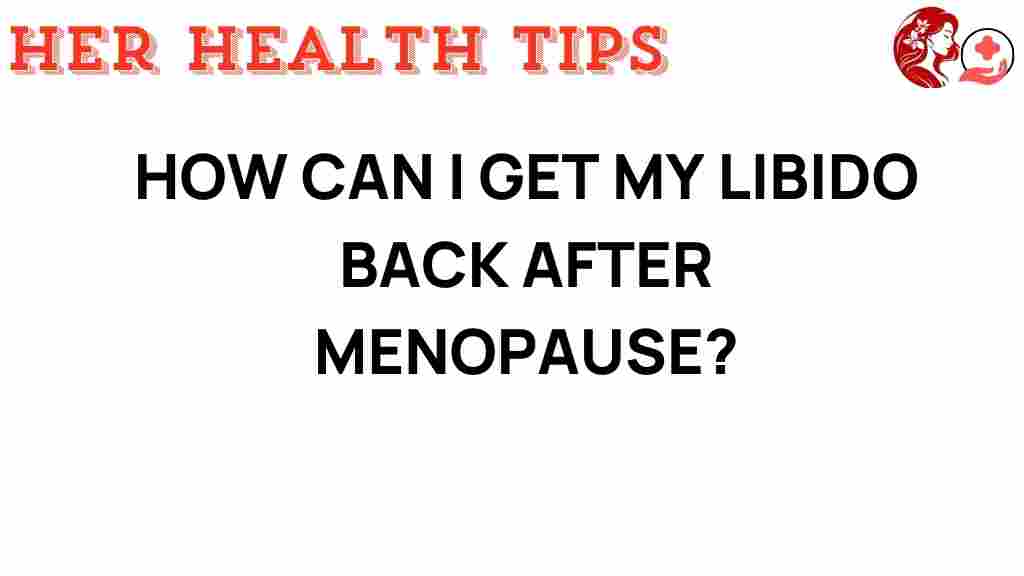Rediscovering Desire: How to Reignite Your Libido Post-Menopause
As women transition through menopause, they often experience a myriad of changes, both physically and emotionally. One significant change that many women encounter is a decrease in libido. This decrease can affect not only sexual health but also overall intimacy and relationship satisfaction. However, it is possible to reignite your desire and enhance your wellness post-menopause. In this article, we will explore effective strategies to help you boost your libido and restore intimacy in your life.
Understanding Libido and Menopause
Libido, or sexual desire, can fluctuate for various reasons, especially during and after menopause. Hormonal changes during this period can lead to reduced levels of estrogen and testosterone, which play crucial roles in sexual function. Understanding these changes is the first step toward rejuvenation.
- Estrogen: This hormone helps maintain vaginal lubrication and elasticity. Low levels can lead to dryness, discomfort, and a decrease in sexual desire.
- Testosterone: Although often associated with men, women also produce testosterone, which is vital for libido. A decrease can result in lower sexual desire.
Other factors that can impact libido during menopause include:
- Stress and anxiety
- Changes in body image
- Fatigue
- Chronic health conditions
Steps to Reignite Your Libido Post-Menopause
Reigniting your libido post-menopause involves a multifaceted approach that focuses on hormone balance, physical wellness, and emotional intimacy. Here’s a step-by-step guide:
1. Consult with a Healthcare Provider
Before making any changes, it’s essential to consult with a healthcare provider. They can offer personalized recommendations based on your health history and current symptoms. Consider discussing:
- Hormone replacement therapy (HRT)
- Non-hormonal treatments
- Supplements and vitamins
2. Focus on Hormone Balance
Maintaining hormone balance is crucial for enhancing libido. Here are some ways to achieve this:
- Diet: Incorporate foods rich in phytoestrogens, like soy products, flaxseeds, and whole grains.
- Exercise: Regular physical activity can boost testosterone levels and improve mood, enhancing sexual desire.
- Supplements: Consider supplements like maca root or ginseng, known for their libido-enhancing properties. Always consult your healthcare provider first.
3. Prioritize Sexual Health
Taking care of your sexual health can greatly influence your libido. Here are some tips:
- Vaginal Moisturizers: Use water-based lubricants or vaginal moisturizers to alleviate dryness.
- Regular Check-ups: Schedule regular gynecological exams to monitor your sexual health.
4. Enhance Intimacy with Your Partner
Emotional intimacy is just as important as physical intimacy. Here are some ways to reconnect with your partner:
- Communication: Openly discuss your feelings and desires. Honesty can foster a deeper connection.
- Quality Time: Dedicate time for each other without distractions. Consider date nights or weekend getaways.
- Exploration: Experiment with new activities together, whether they are sexual or not, to strengthen your bond.
5. Mindfulness and Relaxation Techniques
Stress and anxiety can significantly impact your libido. Incorporating mindfulness and relaxation techniques can help:
- Yoga and Meditation: These practices can reduce stress and improve mental clarity.
- Breathing Exercises: Simple breathing exercises can help calm your mind and body, enhancing your intimate moments.
Troubleshooting Common Challenges
Even with the best intentions, you may face challenges when trying to boost your libido post-menopause. Here are some common issues and solutions:
1. Persistent Vaginal Dryness
If you experience ongoing vaginal dryness despite using lubricants, consider discussing prescription options with your healthcare provider, such as hormonal creams or vaginal rings.
2. Lack of Interest in Intimacy
If you find that your desire is still low, consider seeking support from a therapist who specializes in sexual health. They can help you address underlying emotional issues.
3. Relationship Struggles
Sometimes, relationship dynamics can affect intimacy. Couples counseling can provide a safe space for both partners to express their feelings and work on their relationship.
Conclusion
Reigniting your libido post-menopause is a journey that involves understanding your body, enhancing intimacy, and prioritizing your sexual health. By focusing on hormone balance, emotional connection, and self-care, you can rediscover desire and foster a fulfilling intimate relationship.
Remember, every woman’s experience with menopause is unique. It’s essential to listen to your body and seek professional advice when necessary. For more information on sexual health and menopause, feel free to explore this resource.
Embrace this new chapter of your life with confidence and joy, and take proactive steps toward rejuvenation and wellness in your sexual health and relationships.
This article is in the category Reproductive and created by HerHealthTips Team
